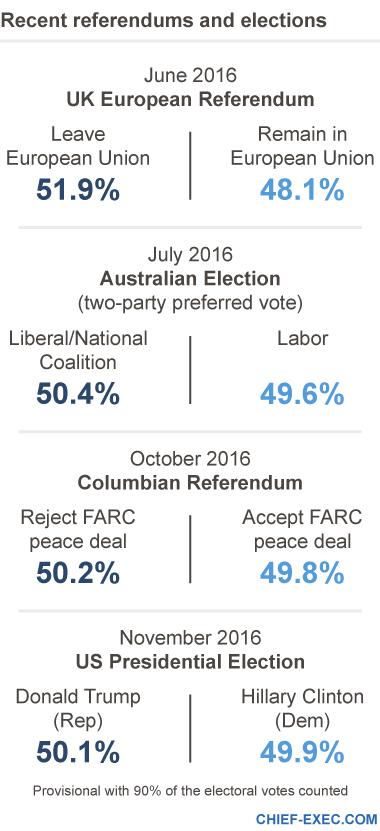The result was due in the early hours of Wednesday morning in the UK. It took longer to become definitive.
At 7:40am Hillary Clinton conceded defeat and Donald Trump exceeded expectations, except perhaps his own, and was declared victor in a cliff hanger US presidential election.
Whatever the outcome there is one result that has been certain for much longer – a more divided society. The issues that have separated the protagonists will not disappear and their understanding and resolution is impeded by a polemic that will continue between those on both sides who prefer not to listen. It is like a dialogue between the deaf.
 Here we show a snapshot of some very recent referendums and elections.
Here we show a snapshot of some very recent referendums and elections.
The US election was not the only cliff hanger outcome. Other countries too have been divided and by very narrow margins. Does this mean that a minority of any size should be ignored? Is there something in the make-up of modern society that leads to such marginal majorities? What does this say about democracy?
The “tyranny of the majority” describes how the many exercise legal and moral superiority over the few, ignoring their rights. What happens when the minority is almost as large as the majority?
Marginal elections and referendums are decided by a relatively small group of floating voters, who differ from the larger majority that keep to their original view throughout a campaign. How do the floaters decide? Does the result represent “the will of the people” or is it the outcome of a few hundred thousand tossed coins?
The questions abound.
At Chief-Exec.com our role is to consider these questions and others over the coming weeks and months, to let the dust settle and give a considered and concise appraisal of the recent tumultuous events and their consequences.
A healing phase is now needed in the US. Citizens must remember that they are players on the same team and share the same planet.
In the UK the situation continues to worsen. Incendiary newspaper headlines, opportunistic politicians and social network ranting all aim to create and sustain an impression of two warring factions – the us and the them – the bremorons and the remoaners – to cement an allegiance to either cause by antipathy and even fear of the “other”. Campaigns are played out in the domain of the emotions where factual discourse is considered unwanted and confusing.
Citizens with differing views are told to “get over it, you lost, move on and join the winning side”. Large minorities now seem likely to be ignored and become disenfranchised “citizens of nowhere”. Next stop: is it fascism or strength through diversity?
Another key question.
Many real people behind the facade are themselves as individuals torn by these same societal divisions, which they need to rationalise within themselves.
This was witnessed in the heart-rending testimony of Colombian-French politician Íngrid Betancourt who was kidnapped by the FARC rebels in 2002, tortured and held captive for six years. She expressed her hatred of the FARC for what they had done to her, how her emotions originally compelled her to reject any peace deal to end the 52-year insurgency that cost more than 250,000 lives. She went on to describe the struggle with her awareness that the peace deal would make the world a better place for her children and her grandchildren. For her, this heroic struggle between emotion and rationale was played out with dignity and eloquence. Not everyone can reach such an internal reconciliation.
People torn by polarised views encounter personal difficulties. Businesses that have such internal stresses can never hope to be efficient and functional. Economies will not do well when slightly less than 50 per cent of a population feel they are not stakeholders.
Is it time for a revolution – one of moderation and tolerance in an open society?




